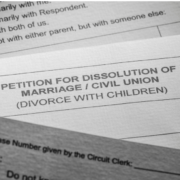Spending Money While Going Through a Divorce
Part of the divorce settlement process includes determining how to divide marital assets equitably. Equitably does not always mean equally, and factors in that calculation may differ from state to state. However, one thing that divorcing spouses need to avoid is the dissipation of marital assets.
Dissipation is the legal term for using funds in an extraordinary or unnecessary manner – in other words, wasting money. Such expenditures can be deemed as retaliatory, or an effort to decrease the spouse’s portion of the assets, and can result in penalties.
While going through the divorce procedure, avoid major expenses that are not typical, for instance purchasing a luxury automobile or going on vacation. Even frequent smaller purchases could be considered dissipation if the accumulated expenditure becomes substantial. Avoid the sale of assets: a boat, jewelry, etc. Even if you think it is “yours,” in the judgment of the court, all assets acquired during the marriage are deemed joint assets and will be calculated into the total sum of marital assets.
When a spouse brings a complaint of dissipation and the court judges in his or her favor, the judge generally will award that asset to the spouse who spent it and give the other spouse a financial award in the same amount. For instance, if you spent $20,000 on a luxurious vacation, the judge will determine that you have spent $20,000 of your assets already and your spouse may get $20,000 more than you do at the division of assets.
But what if you suspect your spouse to be the one wasting money? It can be difficult to prove if you do not have access to all financial records during the divorce. Major purchases or expenditures may be easier to identify, but for frequent extravagant expenses, gambling losses, or other wasteful spending, you may have to engage a forensic accountant to analyze the expenditures in order to determine if they are substantial and frivolous.
Prior to a divorce, a person may be tempted to hide money. If most of the money is in your spouse’s name, it is a wise idea to move some funds into an account in your name so that you have money available in the short term. However, do not hide it. Money can be traced, and the court may further penalize you for perceived ill will. And under some circumstances, a spouse can demonstrate dissipation started before the divorce was filed, so spend carefully if you suspect a divorce is imminent.





